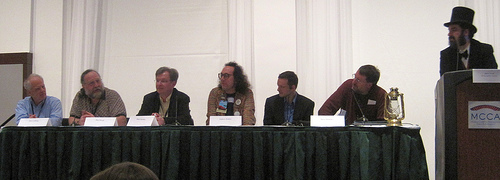I recently went from presenting at the prestigious and vibrant University of North Dakota Writers Conference to being on a panel at the massive Penny Arcade Expo in Boston.
First things first: The former was “Mind the Gap: Print, New Media, Art,” the 41st UND Writers Conference. Last year at UND the presenters included Charles Baxter and Chuck Klosterman; the year before, Russel Banks, my colleague Junot Díaz, Alice Fulton, and Salman Rushdie.
To provide some perspective, back in 1978 the lineup at this conference was John Ashbery, Amiri Baraka, William Burroughs, Ring Lardner, Tillie Olsen, and Eudora Welty.
This year I heard Art Spiegelman in conversation about his comic and New Yorker cover art, Frank X. Walker on his poems giving voice to the journey of York (who accompanied Lewis and Clark on their expedition as Clark’s slave), Cecelia Condit on her video art, and three of my fellow electronic literature writers, with their diverse approaches: Mark Amerika, Deena Larsen, and Stuart Moulthrop. I had to leave before I could hear slam poet Saul Williams, but I’m grateful for what I was able to experience of the conference. And I’m grateful that I was able to be on two panels, select a reel of music videos for the associated film festival, speak to a computer science class, and present several collaborative and individual projects to a sizable audience in the main room of UND’s student union:
- Ad Verbum, my interactive fiction piece from 2000, inspired by the constrained writing of the Oulipo. Thanks again to the young interactor who volunteered to try collecting items in and escaping from the Sloppy Salon.
- 2002: A Palindrome Story, by Nick Montfort and William Gillespie. I showed the Reifier interface and read from the very beginning and end.
- Implementation by Nick Montfort and Scott Rettberg. I explained the project and read eight texts (stickers, mailing labels) from it.
- Currency, by Roderick Coover (video) and Nick Montfort (text). I showed “Filip a Guinea: The Elephant and Castle.”
- Taroko Gorge, the poetry generator I wrote in Taiwan.
- My ongoing series of tiny perl poetry generators, ppg256.
The people in Grand Forks, ND were polite (I was told I shouldn’t be surprised about this) but also surprisingly receptive. It was certainly a different sort of crowd than I met at Banff, with many people from the community and even driving in from surrounding areas. I think they saw some of the pleasure in writing under constraint, some of the benefits of writing collaboratively, and some of the potential of computation, which I tried to show could be turned to literary ends.
Although I got to converse with Stuart and Deena on and off our panels, I came in too late for one of their readings and had to leave before I could hear the other one. I did get to hear Mark Amerika take us from his early writing in The Kafka Chronicles up through his Web work and recent moving image project, all of which are fresh and impressive. His video work is certainly impelled ahead by the work of Chris Marker, whose Sans Soleil Mark selected for the film festival. I should note that I also loved getting to watch Timecode, Stuart Moulthrop’s selection.
Thanks again to Crystal Alberts for inviting me and for her work on this very successful conference.
When I can manage, I’ll write a bit about the very different but also incredible Penny Arcade Expo East…



